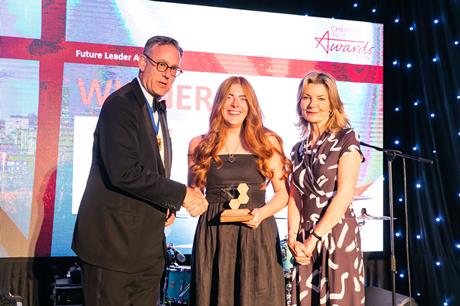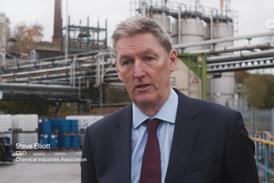- Home
- About
Economic Reports
The CIA gathers industry insights through a quarterly business survey to advocate for our members’ interests with policy makers, regulators and other stakeholders.
Read more
- Our focus
CIA Sustainable Health Metrics Tool
Use our Sustainable Health metrics to drive continuous improvement and foster a sustainable, healthy workplace.
Read more
- The Chemical Industry
The Chemical Industry
The chemical and pharmaceutical industry is fundamental to modern society. With an immense variety of products, from vital medicines and foods, the construction of buildings, to transport and leisure, the industry truly does have an impact on virtually every aspect of our daily lives.
Read more
- Events
- News
- Become a member
Future Leader Award Winner 2025

Young Ambassador Award
This award recognises an outstanding young person demonstrating communication skills and leadership associated with the chemical industry and contributing to its success.
The Young Ambassador is responsible for leading the ChemTalent network for their ‘year in office’.
Enter
Meet previous Young Ambassador winners
Q&A with CIA’s Future Leader Award winner – Elish Chambers
This year, Elish Chambers, Engineering Operations Manager at GSK won the Future Leader Award sponsored by the Salters’ Company.
Elish won the Future Leader Award for outstanding early-career impact in the chemical industry. A passionate communicator and people leader, she’s driven safety, innovation, and team development at GSK. Her commitment to industry resilience, skills growth, and sustainability marks her as a true future leader in the UK chemicals sector.

1. How did it feel when your name was announced?
I was totally surprised to hear my name announced as winner; the shortlist was incredibly strong with talent from across the industry, so I felt proud and humbled to be honoured with the Future Leader award. I also felt huge gratitude to my colleagues, friends, and family who have helped me reach this point in my career. More than anything, I felt honoured to realise that this award is not just about personal achievement—it is a chance to represent young professionals, advocate for the chemical industry, and contribute to driving meaningful change in the sector. It is a responsibility I am truly privileged to take on.
2. Tell us a bit about you and your background.
I graduated with a master’s in chemical engineering from Lancaster University, where I took my first step into the chemical industry completing process engineering internships at GSK and AstraZeneca during my studies. Following graduation, I joined GSK’s Future Leader Programme, a rotational scheme through engineering disciplines at different manufacturing sites. In my current rotation as an Engineering First Line Leader, I lead a team of engineering technicians to ensure safety, operational performance, and continuous improvement across liquid inhalations manufacturing, filling and packaging. I’ve also previously completed rotations as a Project Engineer and Platform Engineer. Alongside my technical role, I am passionate about promoting inclusion and inspiring the next generation to pursue careers in the chemical industry. I serve as a board member for WISE Young Professionals, where I work to drive inclusivity in STEM fields.
3. What do you love about your job?
What I love most about my job is the variety of opportunities it gives me to make a meaningful impact. Being on a graduate scheme, I’ve valued to opportunity to rotate through different roles and departments, building my foundation as a young engineer. Whether I’m solving technical challenges, supporting my team’s growth, or contributing to cultural change, I know the work I do plays a role in delivering life-changing medicines to patients. The fast-paced and ever-evolving nature of the chemical industry means I’m constantly learning, which keeps me motivated and excited about the future.
4. What first interested you about the chemical industry?
Initially, I studied medicine, but I discovered my passion for the chemical industry after switching to chemical engineering at university. I was inspired by the sector’s ability to create solutions that directly improve lives, from sustainable energy to pharmaceuticals. What excites me most is how dynamic the industry is—constantly evolving to tackle global challenges like sustainability and innovation. The blend of science, collaboration, and creativity captivated me, and I’ve since been motivated to showcase the breadth of opportunities within the industry and dispel stereotypes that may deter others from exploring it.
5. What do you think can be done to attract others to join the industry?
To attract others to the chemical industry, we need to showcase the diverse career opportunities it offers and emphasise its real-world impact. Many people don’t realise the breadth of roles available, from engineering and research to marketing and supply chain. Outreach programmes, hands-on workshops, and insight days are great ways to engage future talent and break down stereotypes. It’s also important to create accessible entry points, such as apprenticeships, internships, and mentorship schemes, to make the industry more inclusive. By highlighting how the chemical industry contributes to solving global challenges—like sustainability, healthcare, and innovation—we can inspire the next generation to see it as an exciting and meaningful career choice.
6. What do you hope to achieve as Young Ambassador with the ChemTalent network?
As Young Ambassador, I hope to achieve three key goals: learn, advocate, and educate. I want to learn from professionals across the chemical industry to better understand the shared challenges we face, as well as the unique opportunities and issues in different sectors. By building this understanding, I aim to advocate for the industry—amplifying the voices of young professionals, influencing policy, and championing innovation and sustainability to help the sector thrive. Finally, I hope to educate the public and future talent about the breadth of roles and opportunities in the industry, from STEM to marketing and beyond, while showcasing its transformative work. I want to inspire more people to see the chemical industry as an exciting and meaningful career choice.
7. What do you consider to be the biggest challenges facing our industry at the moment?
The industry faces several challenges, including managing sustainability while maintaining growth, addressing skills gaps, and navigating economic pressures like high energy costs. As we transition to greener solutions, innovation in renewable resources and circular economy practices is vital. Additionally, attracting and retaining talent is crucial to support technological integration and maintain competitiveness. These challenges require collaboration, adaptability, and a commitment to fostering a skilled and inclusive workforce.
8. Where would you like to see yourself in ten years’ time?
In ten years, I hope to be in a leadership role where I can contribute to shaping the future of the chemical industry. I aspire to lead initiatives that drive sustainability, foster diversity and inclusion, and support innovation to address the evolving needs of the sector. Mentoring young professionals is also something I’m passionate about, as I want to help others build fulfilling careers and encourage the next generation of talent to see the chemical industry as a force for positive change. Ultimately, I’d like to be part of positioning the industry as a global leader in tackling societal challenges like clean energy, healthcare, and environmental sustainability.
9. Finally, there are some exciting plans in place for ChemTalent over the coming year. How can people get involved?
ChemTalent provides an invaluable platform for young professionals to connect, develop skills, and contribute to the industry’s future. People can get involved by attending events, participating in workshops, and sharing their perspectives on key issues. I encourage everyone to sign up for the ChemConnect newsletter and reach out to chemtalent@cia.org.uk to join the network. Together, we can inspire, innovate, and transform the industry for the better.





